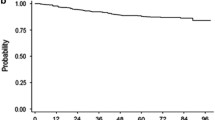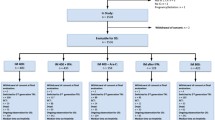Abstract
To evaluate the efficacy of imatinib in a practical setting, we registered 43 patients with newly diagnosed chronic myelogenous leukemia (CML) (group I) and 56 patients with previously diagnosed CML (group II) at 11 hematology centers in Nagasaki prefecture, Japan, from December 2001 to July 2005 and analyzed the molecular responses. Cytopenia, fluid retention, and skin rash were major adverse events, along with elevation in creatine phosphokinase levels. With a follow-up of approximately 3.5 years, imatinib treatment led to 88.7% overall survival (OS) and 85.2% progression-free survival (PFS) rates for group I, and 79.8% OS and 76.6% PFS rates for group II; the rates were not significantly different despite a lower average imatinib dose in group II.The rates of complete cytogenetic response at 30 months and major molecular response at 24 months were 86.1% and 62.5%, respectively, in group I, and 77.9% and 58.3% in group II; the rates were not significantly different. As has been reported by other groups, these results demonstrate that imatinib treatment can provide excellent clinical and molecular effects for not only newly diagnosed but also previously treated CML patients in practical settings that cover a wider variety of patients than clinical trials.
Similar content being viewed by others
References
Goldman JM, Melo JV. Chronic myeloid leukemia: advances in biology and new approaches to treatment. N Engl J Med. 2003;349:1451–1464.
Borthakur G, Cortes JE. Imatinib mesylate in the treatment of chronic myelogenous leukemia. Int J Hematol. 2004;79:411–419.
Deininger M, Buchdunger E, Druker BJ. The development of ima- tinib as a therapeutic agent for chronic myeloid leukemia. Blood. 2005;105:2640–2653.
O’Brien SG, Guilhot F, Larson RA, et al, for the IRIS Investigators. Imatinib compared with interferon and low-dose cytarabine for newly diagnosed chronic-phase chronic myeloid leukemia. N Engl J Med. 2003;348:994–1004.
Hughes TM, Kaeda J, Branford S, et al, for the International Randomised Study of Interferon versus STI571 (IRIS) Study Group. Frequency of major molecular responses to imatinib or interferon alfa plus cytarabine in newly diagnosed chronic myeloid leukemia. N Engl J Med. 2003;349:1423–1432.
Yanada M, Takeuchi J, Sugiura I, et al. High complete remission rate and promising outcome by combination of imatinib and chemotherapy for newly diagnosed BCR-ABL-positive acute lym- phoblastic leukemia: a phase II study by the Japan Adult Leukemia Study Group. J Clin Oncol. 2006;24:460–466.
Thomas DA, Faderl S, Cortes J, et al. Treatment of Philadelphia chromosome-positive acute lymphocytic leukemia with hyper- CVAD and imatinib mesylate. Blood. 2004;103:4396–4407.
Champagne MA, Capdeville R, Krailo M, et al. Imatinib mesylate (STI571) for treatment of children with Philadelphia chromosome- positive leukemia: results from a Children’s Oncology Group phase 1 study. Blood. 2004;104:2655–2660.
Bonifazi F, Vivo de A, Rosti G, et al, for the European Study Group on Interferon in Chronic Myeloid Leukemia. Chronic myeloid leukemia and interferon-α: a study of complete cytogenetic responders. Blood. 2001;98:3074–3081.
Kim YJ, Kim DW, Lee S, et al. Comprehensive comparison of FISH, RT-PCR, and RQ-PCR for monitoring the BCR-ABL gene after hematopoietic stem cell transplantation in CML. Eur J Haematol. 2002;68:272–280.
Olavarria E, Kanfer E, Szydlo R, et al. Early detection of BCR- ABL transcripts by quantitative reverse transcriptase-polymerase chain reaction predicts outcome after allogeneic stem cell transplantation for chronic myeloid leukemia. Blood. 2001;97:1560–1565.
Branford S, Rudzki Z, Harper A, et al. Imatinib produces significantly superior molecular responses compared to interferon alfa plus cytarabine in patients with newly diagnosed chronic myeloid leukemia in chronic phase. Leukemia. 2003;17:2401–2409.
Wright JR, Bouma S, Dayes I, et al. The importance of reporting patient recruitment details in phase III trials. J Clin Oncol. 2006;24:843–845.
Branford S, Rudzki Z, Walsh S, et al. Detection of BCR-ABL mutations in patients with CML treated with imatinib is virtually always accompanied by clinical resistance, and mutations in the ATP phosphate-binding loop (P-loop) are associated with a poor prognosis. Blood. 2003;102:276–283.
Roche-Lestienne C, Soenen-Cornu V, Grardel-Duflos N, et al. Several types of mutations of the Abl gene can be found in chronic myeloid leukemia patients resistant to STI571, and they can preexist to the onset of treatment. Blood. 2002;100:1014–1018.
Soda M, Ikeda T, Matsuo T, Suyama A. Cancer incidence in Nagasaki prefecture 1993-1997. In: Parkin DM, Whelan SL, Ferlay J, Teppo L, Thomas DB, eds. Cancer Incidence in Five Continents Vol.VIII. Lyon, France: International Agency for Research on Cancer/International Association of Cancer Registry; 2003:390–393.
Cortes J, Talpaz M, O’Brien S, et al. Molecular responses in patients with chronic myelogenous leukemia in chronic phase treated with imatinib mesylate. Clin Cancer Res. 2005;11:3425–3432.
Morishima Y, Ogura M, Nishimura M, et al. Efficacy and safety of imatinib mesylate for patients in the first chronic phase of chronic myeloid leukemia: results of a Japanese phase II clinical study. Int J Hematol. 2004;80:261–266.
Druker BJ, Talpaz M, Resta DJ, et al. Efficacy and safety of a specific inhibitor of the BCR-ABL tyrosine kinase in chronic myeloid leukemia. N Engl J Med. 2001;344:1031–1037.
Talpaz M, Silver RT, Druker BJ, et al. Imatinib induces durable hematologic and cytogenetic responses in patients with accelerated phase chronic myeloid leukemia: results of a phase 2 study. Blood. 2002;99:1928–1937.
Kantarjian HM, Talpaz M, O’Brien S, et al. Dose escalation of imatinib mesylate can overcome resistance to standard-dose therapy in patients with chronic myelogenous leukemia. Blood. 2003;101:473–475.
Kantarjian H, Talpaz M, O’Brien S, et al. High-dose imatinib mesylate therapy in newly diagnosed Philadelphia chromosome- positive chronic phase chronic myeloid leukemia. Blood. 2004;103:2873–2878.
Author information
Authors and Affiliations
Corresponding author
About this article
Cite this article
Matsuo, E., Miyazaki, Y., Tsutsumi, C. et al. Imatinib provides durable molecular and cytogenetic responses in a practical setting for both newly diagnosed and previously treated chronic myelogenous leukemia: a study in Nagasaki prefecture, Japan. Int J Hematol 85, 132–139 (2007). https://doi.org/10.1532/IJH97.06157
Received:
Accepted:
Published:
Issue Date:
DOI: https://doi.org/10.1532/IJH97.06157




